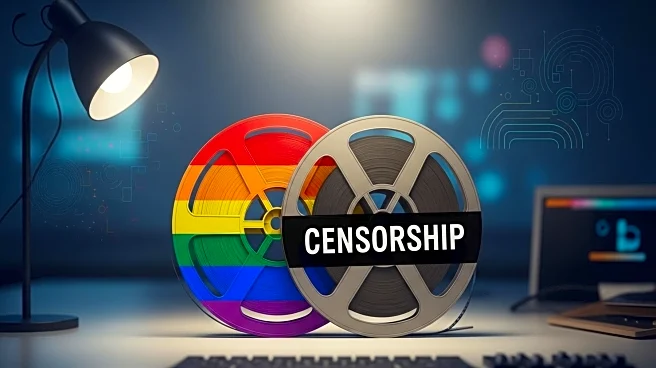What is the story about?
What's Happening?
A Chinese film distributor, Hishow, has faced criticism for reportedly using artificial intelligence to alter a same-sex wedding scene in the film 'Together,' turning one of the men into a woman. The film, written and directed by Michael Shanks, features American actors Alison Brie and Dave Franco. The alteration was discovered during prerelease screenings in China, leading to backlash on social media. Neon, the film's global distributor, has condemned the unauthorized edit and called for the screenings to be halted. The film's wide release in China has been postponed, with no new date announced. This incident highlights ongoing censorship issues in China, particularly regarding LGBTQ content.
Why It's Important?
The use of AI to alter film content raises significant concerns about censorship and the representation of LGBTQ individuals in media. In China, homosexuality has been decriminalized, yet remains a target of government censorship. This incident underscores the challenges faced by filmmakers and distributors in navigating cultural and political sensitivities. The broader implications include potential impacts on international film distribution and the creative freedom of filmmakers. The use of technology to enforce censorship could set a precedent, affecting how films are edited and perceived globally.
What's Next?
The postponement of the film's release suggests ongoing negotiations or adjustments to meet distribution requirements. Stakeholders, including Neon and Hishow, may engage in discussions to resolve the issue. The incident could prompt further scrutiny of AI's role in film editing and censorship, potentially influencing future policies and practices in the industry. Filmmakers and distributors might seek clearer guidelines to prevent unauthorized alterations and protect creative integrity.
Beyond the Headlines
The ethical implications of using AI for censorship are profound, raising questions about artistic integrity and the rights of creators. This development could lead to broader debates about the role of technology in storytelling and the preservation of cultural narratives. The incident also highlights the tension between global media standards and local cultural norms, potentially influencing future collaborations and content distribution strategies.
















